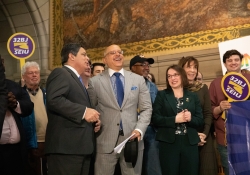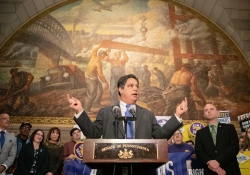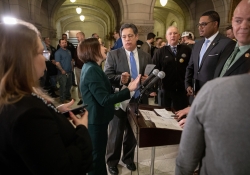Harrisburg – June 24, 2019 – Health and Human Services Committee Democratic Chairman State Senator Art Haywood (D-Montgomery/Philadelphia) joined members of the PA General Assembly and statewide advocates to fight to protect the General Assistance program. House Bill 33, which is now in the Senate for consideration, would eliminate the program which provides cash assistance to those who are in urgent need.
“Ending general assistance will unnecessarily hurt veterans, domestic violence survivors, the disabled, and our most vulnerable residents.” said Senator Haywood.
“The General Assistance program is a last resort for folks who have nowhere else to turn, many of them are seeking substance abuse treatment, living with a disability, or fleeing domestic violence situations,” said Senator Costa, Democratic Leader of the PA Senate. “I am not proud of what it says about us as a state if we turn our backs on the people who need us most.”
“I am alive today because General Assistance is supporting my stability and helping me live independently again after being homeless for 25 years. In four weeks, it will be two years since I first applied for [SSDI] help,” said John Boyd, General Assistance recipient. “General Assistance is the only money I have to buy deodorant or anything that is not food. The $205 dollars a month is a lifesaver.”
The proposed elimination of General Assistance by Republicans abandons the most vulnerable amongst us, and is a departure of our most fundamental responsibility as a government, the protection of the people of our commonwealth,” said Senator Street. “This will imperil the livelihood of our veterans, the disabled, those suffering from chronic disease and more. As a caucus we will use every means available to us to prevent this from happening.”
“As a program that primarily serves individuals with disabilities, General Assistance is a critical bridge between that disability and self-sufficiency. The Pennsylvania Health Access Network is a statewide organization on the frontlines of helping individuals with their healthcare needs,” said Antoinette Kraus, Executive Director of the Pennsylvania Health Access Network. “Eliminating this program jeopardizes the health and well-being of individuals who cannot work due to their disability and have no other means of support. We strongly urge lawmakers to preserve this program, vote no any legislation that ends the program, and fund General Assistance in the budget.”
“Community Legal Services urges Senators and the Governor to hear the voices of those who do not often reach the Capitol: those who are served by General Assistance. This small and targeted program reaches people in every county who are disabled, fleeing domestic violence, or who are completing treatment for substance use disorder,” said Maria Pulzetti, Attorney at CLS. “Most people receive GA for less than one year. My clients use GA to stay housed, to get to medical appointments, and to do laundry.”
“Just Harvest works to build an accessible and fair system where people can meet their basic needs. General Assistance isn’t a lot of money, it’s only $200 a month. But it’s a bus pass, toiletries, just enough to access county housing or pay a friend to stay on their couch without putting them out. It’s not much, but it’s some stability and some dignity in a difficult time,” said Ann Sanders, Public Policy Advocate at Just Harvest. “General Assistance is small, but it’s a critical lifeline for people who are weathering some of the worst of life’s storms. In all budgets, but especially a budget season where we hear the words surplus and talk of putting cash in the Rainy-Day Fund—we have to remember that it’s still raining for a lot of Pennsylvanians. We have to fully fund General Assistance.”
“The fight to eliminate the General Assistance program is an attack on poor, vulnerable citizens,” said Senator Hughes. “I call on my fellow elected officials to take a stand to protect the General Assistance program and the thousands of people it benefits. We must support policy that promotes human decency, rather than cutting critical programs for those in need.”
###
Harrisburg, Pa. − June 24, 2019 − Members of the Pennsylvania Senate Democratic Caucus today jointly sent a letter to Governor Tom Wolf requesting a disaster declaration for gun violence in the Commonwealth.
“We believe it is necessary to raise the public’s awareness of the massive loss of human life and the suffering inflicted on affected family, friends and neighbors where this tragedy is unfolding daily,” they wrote. “Just as you have signed six disaster declarations to provide every tool at the Commonwealth’s disposal to combat the opioid epidemic, the death toll and impact from illegal guns should merit immediate and coordinated attention.”
Specifically, a disaster declaration could do the following:
- Establish a task force led by the Department of Health to create and implement a public health framework for addressing gun violence
- Establish a command center in the Pennsylvania Emergency Management Agency to coordinate state and local law enforcement response
- Enhance the Joint-Local State Firearm Taskforce through additional personnel and funding to take illegal guns off the street
- Expand information gathering and sharing between all levels of law enforcement and community groups
- Increase law enforcement presence, both local and state, in targeted areas where gun violence is most prevalent
- Expedite and expand grants and other funding sources for community groups and nonprofit associations with a proven record of violence reduction and prevention
- Provide additional state resources for behavioral and mental health
- Bringing to bear the significant wealth of knowledge and experience in the Departments of Health and Human Services to provide de-escalation and de-confliction training throughout the community
- Require the Pennsylvania Department of Education provide training and professional development on trauma-informed education
View full letter →
###

Harrisburg PA – June 4, 2019 – State Sen. Vincent Hughes (D-Philadelphia/Montgomery) and Rep. Sara Innamorato (D-Pittsburgh) led House and Senate Democrats in announcing several voting reform proposals Tuesday in the Main Capitol Rotunda.
The legislators were joined by a large group of advocates and supporters pushing for automatic voter registration, no excuse absentee voting, same day voter registration and campaign finance reform. Sen. Hughes and Rep. Innamorato are proposing similar bills that would allow those eligible to register to vote when signing up for critical state services such as renewing drivers licenses or applying for a public benefit administered by the state.
“Our democracy depends on its voters, which is why we are fighting to ensure every eligible person has a chance to voice their opinion at the ballot box,” said Sen. Hughes, who is proposing Senate Bill 608. “We have a broad coalition of folks who understand this and are fighting for Pennsylvanians ability to have their voices at the ballot box. Expanding access and simplifying the processes will help do that for our communities across the commonwealth.”
Pennsylvania has 8.6 million registered voters, but less than 55 percent of voting-age citizens turned out in the 2018 midterm elections, with varying reasons impeding participation including work, illness, and other unforeseen circumstances. Research shows higher voter turnout in states that have enacted some or all of the reforms the coalition is seeking.
“Participatory government demands equal access to participation,” said Rep. Innamorato, who has proposed House Bill 1556 on automatic voter registration. “Too often, the complicated registration process we have in place poses a significant obstacle to access to the ballot. Automatic voter registration and our other proposals would make it easier for all Pennsylvanians to have a voice, get informed and be heard. We need to be removing barriers to participation, not erecting new ones. These are the first steps in the fight for a fair, secure democracy in our commonwealth and our communities.”
Sen. Wayne Fontana (D-Allegheny) and Rep. Jennifer O’Mara (D-Springfield) discussed their proposals to expand early voting, which aim to expand voting beyond the 13-hour time frame Pennsylvania currently mandates. Both proposals would expand the time frame greatly and add options to vote on the weekend. Sen. Fontana is proposing SB 294 and Rep. O’ Mara is proposing HB 1558.
“If people don’t vote, democracy doesn’t work,” Sen. Fontana said. “If people can’t vote, we are shortchanging our democracy. During the most recent primary election last month, many counties across the state were lucky to have even a 20 percent voter turn-out. It’s obvious we need to find ways to improve voter access and participation and to me, the task is simple. We need to find ways to make voting easier and more accommodating.”
“Introducing an early voting bill is a priority for me because voting should be easier for everyone,” Rep. O’Mara said. “When I was campaigning, I met a young woman named Kate who uses a wheelchair. She told me her polling pace is not ADA accessible, and voting is a big challenge for her. So, one reason I decided to introduce early voting is so people like Kate have the ease and access to practice their constitutional right. It’s about time Pennsylvania steps up to make voting easier for all its eligible citizens.”
Sen. Judy Schwank (D- Berks) introduced her proposal for no-excuse absentee voting, SB 411, which would allow voters to submit absentee ballots for any reason. Currently, 27 other states and the District of Columbia have enacted no-excuse absentee voting.
“The right to vote is the foundation of our democracy,” Schwank said. “We need to remove needless barriers that keep people from being able to vote or from having their votes counted.”
Rep. Ryan Bizzarro (D-Erie) announced HB 101, which aims to bring same-day voter registration to Pennsylvania while also simplifying the process. His legislation would help increase voter turnout because of increased convenience, while also maintaining integrity in the voting process by not counting same-day registrant votes until the Department of State has verified eligibility.
“The right to vote is the perfect symbol of our democracy,” Rep. Bizzarro said. “Unfortunately, it’s perfect in theory, not in practice. Our outmoded laws – including the one requiring that residents register 30 days in advance of an election to vote in that election – discourage participation by imposing unnecessary hurdles. Our legislation to streamline the process would help fix that.”
Sen. Anthony Williams (D-Philadelphia/Delaware) is proposing shifting ballot positions for candidates running for public office in Philadelphia. The goal of SB 602 is to eliminate the advantages held by candidates who draw first position on the ballot.
“A growing number of Pennsylvanians, especially young voters, are unaffiliated with major parties or uninterested in party politics,” Sen. Williams said. “Those voters still deserve to have a voice in who represents them in city council and the mayor’s office, which is why I’m offering legislation to conduct nonpartisan, ranked-choice voting in the Commonwealth’s largest city, Philadelphia.”
Advocates in attendance included the Pennsylvania Budget and Policy Center, Common Cause, Pennsylvania for Fair Elections, Committee of 79, League of women Voters, Brennan Center for Justice, Keystone Progress, SiX.
Pittsburgh, Pa. − March 14, 2019 − Senators Lindsey M. Williams, Jay Costa, and Vincent J. Hughes, joined by local elected officials, Allegheny County Labor Council members, and a crowd of union workers, announced the introduction of the Workplace Freedom Act today at the Allegheny County Courthouse.
The Workplace Freedom Act legislation protects Pennsylvania workers by strengthening collective bargaining in two ways. First, it eliminates the requirement for a two-tiered election process by allowing for a simple card check where expressing majority support would be sufficient. Second, it requires access to certified unions to new employees so that union membership benefits can be clearly explained.
“I get really fired up when someone says ‘I’m not anti-union. I love those building trades. I just don’t like public sector unions,’” said Senator Williams. “But that isn’t how being pro-union works. First, an injury to one is an injury to all. Second, the statement that ‘I don’t like public sector unions’ vastly discounts the wide variety of public sector workers represented by unions, including our firefighters, 911 operators, police officers, Fish and Boat Commission officers, and even public works employees, electricians, and carpenters at government agencies across the Commonwealth.”
“Unions have long helped workers earn better wages, health care, safety and retirement benefits, which is why we want to ensure unions can continue to work for future members,” Sen. Hughes said. “Pennsylvania workers have seen their greatest gains through the negotiating power of the unions and will not tolerate further erosion of these critical institutions that put worker benefits first.”
“It’s time for elected officials to take a stand,” said Senator Costa. “Working families need elected leaders to stand up to attacks on union rights, and instead create more opportunities for Pennsylvanians to have the freedom to join and form unions. That’s why I’m signing on to the PA Workforce Freedom Act.”
Representative Dan Miller also spoke at the press conference, as well as SEIU members Caitlin Schroering, Pitt Graduate Student Organizing Committee and fourth year Ph.D. candidate; Nick Theis, UPMC Worker Organizing Committee and Medical Researcher at UPMC; Pam Johnston, SEIU 32BJ Executive Board Member and building cleaner at the University of Pittsburgh; and Wanda Smith, SEIU 668 Chapter Chair and supervisor at the Allegheny County Assistance Office.
###
Pittsburgh, Pa. − March 12, 2019 − Senators Lindsey M. Williams, Jay Costa and Vincent J. Hughes will hold a press conference to announce the introduction of the Workplace Freedom Act on Thursday, March 14, 2019 at noon at the Allegheny County Courthouse.
The Workplace Freedom Act legislation protects Pennsylvania workers by strengthening collective bargaining in two ways. First, it eliminates the requirement for a two-tiered election process by allowing for a simple card check where expressing majority support would be sufficient. Second, it requires access to certified unions to new employees so that union membership benefits can be clearly explained.
Over the past century, working Pennsylvanians have seen greater increases in their standard of living during periods of increased unionization. The Janus v. AFSME Supreme Court decision handed down this past June is a direct attack on middle class families. Unions not only provide firefighters, police officers, teachers, caseworkers, and government employees a living wage, but also the resources that allow them to serve taxpayers to the best of their ability.
WHO: Senator Lindsey M. Williams, Senator Jay Costa, Senator Vincent J. Hughes and other elected officials, and Allegheny County Labor Council members
WHAT: Press Conference Announcing Introduction of the Workplace Freedom Act
WHEN: Thursday, March 14, 2019 at Noon
WHERE: Allegheny County Courthouse Grand Staircase | 436 Grant Street | Pittsburgh, Pennsylvania 15219
###







